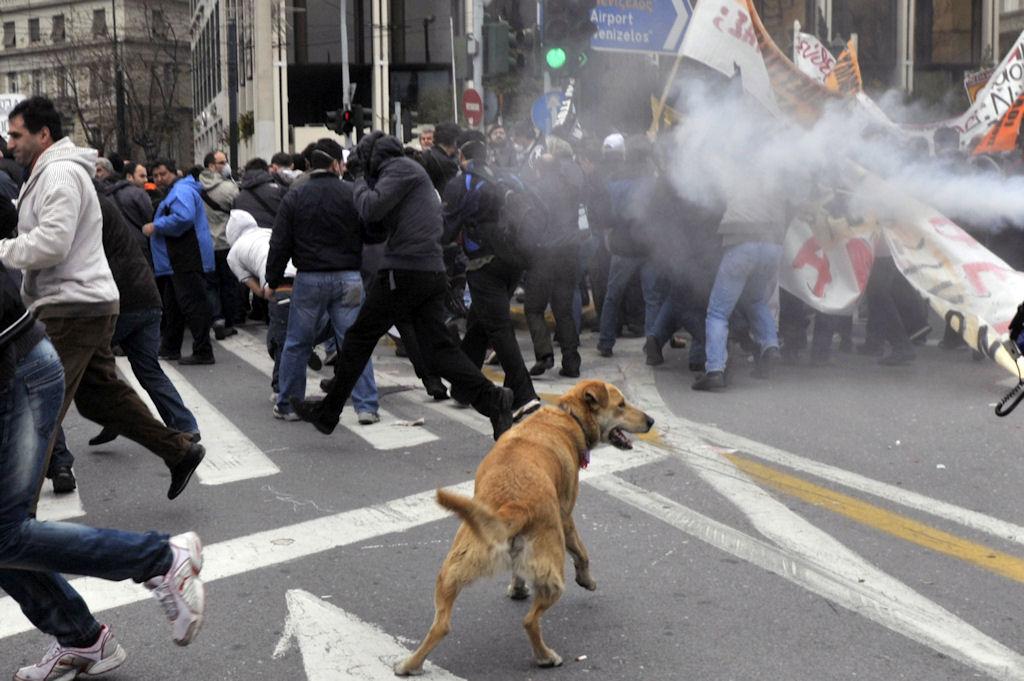Europe’s debt crisis festers out of spotlight
Protesters run from tear gas during clashes which broke out at a march in Athens on Feb. 23, 2011. Greece was hit with a general strike against government austerity measures as Prime Minister George Papandreou seeks to convince the cash-strapped country’s euro zone partners to extend the repayment of a massive rescue loan.
BRUSSELS, Belgium — Remember Europe’s debt crisis?
The earthshaking events that have swept north Africa in recent weeks have given the euro zone’s struggling economies some respite from the media spotlight. But if the sense of panic has lessened, Europe’s financial worries are far from over. In fact, the spreading unrest may yet make them worse as the Middle East chaos means cash-strapped European nations already have to pay more for their oil and gas imports.
Worried by the impact of fuel and raw material costs on inflation, the European Central Bank hinted on Thursday that it could raise interest rates next month, pushing up borrowing costs for indebted nations. Investors looking for a safe haven in turbulent times are unlikely to look to the shaky bonds of Portugal or Spain.
The next few weeks could be decisive for Europe’s efforts to stabilize the debt crisis and build a stronger regulatory framework to ensure nations using the euro no longer get into the sort of financial mess that has shaken the foundations of the shared currency over the past year.
European Union leaders meet on March 11 and again on March 24 with the aim of setting up new rules for safeguarding the public finances of euro zone nations.
As a condition for extending a rescue fund for struggling euro economies, Germany, the EU’s main paymaster, is seeking guarantees that nations bite the austerity bullet to keep their finances in order and push through reforms to make their economies more competitive. Chancellor Angela Merkel wants them to raise retirement ages and scrap laws that ensure wages rise automatically in line with inflation.
“We cannot back off from this conditionality,” said Merkel’s finance minister, Wolfgang Schaeuble, in a recent speech. “That would end the foundation that we build for the European currency. This is why the German government is not prepared to compromise at all on this issue.”
France is backing Germany, but other euro zone nations are seeking to water down Merkel’s plan. Ireland’s prime minister-in-waiting Enda Kenny is seeking a relaxation of the tough terms imposed on his country last year in return for an 85 billion euro ($119 billion) bailout from the EU and International Monetary Fund (IMF). Belgium was hit by a general strike on Friday triggered by union fury over proposed salary caps and its weak caretaker government is in no position to abolish the country’s cherished inflation-like wage rises.
Portugal is in the eye of the euro-debt storm. For months, it has been tipped as the next euro zone domino to tumble, following Greece and Ireland’s ignominious appeals for EU and IMF bailouts.
Portugal needs to raise 10 billion euros by July, but with its economy already slipping toward recession there are widespread doubts that Lisbon can continue to pay the crippling 7 percent-plus interest rates that markets are demanding for taking a risk on its 10-year bonds.
The country did get a glimmer of good news this week. Demand was strong as Lisbon successfully sold 1 billion euros in treasury bills on Wednesday and Finance Minster Fernando Teixeira dos Santos said that Portugal has already met one-third of its financing needs this year.
The concern is that market jitters will intensify if divided EU leaders fail to agree this month on a comprehensive plan to support frailer economies and reassure investors that euro zone nations will be locked into a path of fiscal discipline and economic reform.
The country’s Socialist government is resisting mounting calls that it request an IMF/EU rescue.
Prime Minister Jose Socrates says a bailout won’t solve Portugal’s underlying problems. He insists government economic reforms will make the economy more competitive while austerity measures bring down the budget deficit. At 7.3 percent of gross domestic product last year, Portugal’s deficit was more than twice the EU’s target level, although still lower than the 8.9 percent U.S. spending gap.
However unemployment in western Europe’s poorest country is higher than 11 percent and Portugal’s economy shrunk by 0.3 percent in the fourth-quarter of 2010, heightening fears of a double-dip recession that could further undermine government revenues. Voices are growing for the government to seek international support regardless of the cost of even stricter austerity rules that would be imposed by the rescuers
“We need tough rules, it was lax rules that got us in this mess,” Joao Cesar das Neves, one of the country’s leading economists, told the Jornal de Negocios business daily this week. “We need somebody from outside to come and put things in order and the (International Monetary) Fund could do that. We have to tighten our belts.”
Editor's note: This story was updated to correct a name.
Every day, reporters and producers at The World are hard at work bringing you human-centered news from across the globe. But we can’t do it without you. We need your support to ensure we can continue this work for another year.
Make a gift today, and you’ll help us unlock a matching gift of $67,000!
